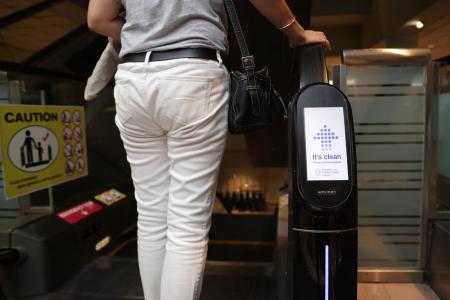Automated escalator handrail cleaning device installed at KKH
In order to quell the public's fear of touching common surfaces during the Covid-19 outbreak, an automated escalator handrail cleaning device was installed at KK Women's and Children's Hospital (KKH) last Friday.
Mr Alson Goh, chief operating officer of KKH, and SingHealth (Environmental Services) said the device was installed at one escalator and will remain for a month to assess its effectiveness.
WeClean, as the device is called, was developed by South Korean company SWIT. It costs at least $9,800 and it is able to clean the handrails using a three-step process.
It first cleans with a disinfectant containing 1.5 per cent hydrogen peroxide. Then it wipes it off with lint-free rollers removing dirt and grease residue. The process is finally completed with sterilisation under an ultraviolet LED lamp.
The device is fitted with a human traffic counter to monitor the size of the crowd. Its cleaning efficiency can be stepped up at high traffic areas, making it popular at shopping malls in countries like South Korea and Thailand.
Mr Ng Tai Rong, head of business development for WeClean Singapore, the sole agent for its products, said the disinfectant had been tested for eye and skin irritation in South Korea, where it was certified as a non-irritant. He added that the company has conducted at least eight product trials at several places since February this year.
Mr Lum Chong Chuen, a member of the mechanical and electrical technical committee of The Institution of Engineers, Singapore, said hydrogen peroxide-based disinfectant is safe for cleaning surfaces but it can evaporate, so proper clinical evaluation has to be conducted to determine if it can be harmful to a person breathing it in over a prolonged period.
He added that ultraviolet light is usually safe for sterilisation, as long as its safety limit has not been exceeded.
Dr Kristen Coleman, a research fellow from the emerging infectious diseases programme at Duke-NUS Medical School, said that while the disinfection method could be effective, it should not reduce the importance of frequent hand washing with soap and water.
Get The New Paper on your phone with the free TNP app. Download from the Apple App Store or Google Play Store now



